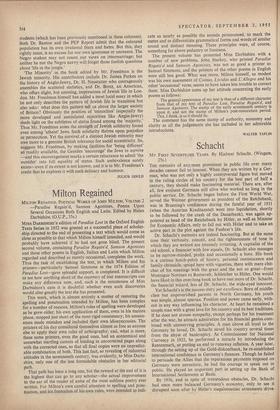Milton Regained
MILTON REGAINED. POETICAL WORKS OF JOHN MILTON, VOLUME 2 —Paradise Regain'd, Samson Agonistes, Poems Upon Several Occasions Both English and Latin. Edited by Helen Darbishire. (0.U.P., 35s.) MISS DARBISHIRE'S edition of Paradise Lost in the Oxford English Texts Series in 1952 was greeted as a successful piece of scholar- ship directed to the end of presenting a text which would come as close as possible to that which Milton himself intended, and would probably have achieved if he had not gone blind. The present second volume, containing Paradise Regain'd, Samson Agonistes and those other poems in English, Italian and Latin which Milton regarded and described as merely occasional, completes the work. Thus the task of establishing the text, to which Milton and his printers—particularly Samuel Simmons in the 1674 Edition of Paradise Lost—gave splendid support, is completed. It is difficult to see how anything short of the recovery of lost manuscripts can make any difference now, and, such is the minuteness of Miss Darbishire's care it is doubtful whether even such discoveries would alter greatly the text she has presented.
This work, which is almost entirely a matter of restoring the spelling and punctuation intended by Milton, has been complex for a number of reasons. Milton's rules of spelling were developed as he grew older; his own application of them, even in his mature phase, stopped just short of the most rigid consistency; his amanu- enses made mistakes and included their own idiosyncrasies. The printers of his day considered themselves almost as free as anyone else to apply their own rules of orthography; and, what is more, these same printers, even the good ones, had an economical and somewhat startling custom of binding in uncorrected pages along with the corrected ones, so that all final copies were an unpredict- able combination of both. This last fact, so revealing of industrial attitudes in the seventeenth century, was evidently, to Miss Darbi- shire, only one of the less formidable obstacles in her editorial path.
That path has been a long one, but the reward at the end of it is the highest that can go to any scholar—the actual improvement to the ear of the reader of some of the most sublime poetry ever written. For Milton's own careful attention to spelling and punc- tuation, and his formation of his own rules, were intended to indi-
cate as nearly as possible the sounds pronounced, to mark the metre and to differentiate grammatical forms and words of similar sound and distinct meaning. These principles were, of course, something far above pedantry or fussiness.
The present volume has presented Miss Darbishire with a number of new problems. John Starkey, who printed Paradise Regain'd and Sanzson Agonistes, was not as good a printer as
Samuel Simmons, and the printers of the other poems in English were still less good. What was more, Milton himself, so modest
was his own assessment of C017111S, Lycidas and L'Allegro and his other 'occasional' verse, seems to have taken less trouble to correct
them. Miss Darbishire sums up her attitude concerning the early poems as follows:
The general appearance of my text is thus of a different character from that of my text of Paradise Lost, Paradise Regain'd, and Samson Agonistes. The stamp of the early seventeenth century is upon it, and not the stamp of Milton's post-restoration period. This, I think, is as it should be.
The comment has the same stamp of authority, economy and clarity as all the judgements she has included in her admirable
introductions.
WALTER TAPLIN


































 Previous page
Previous page